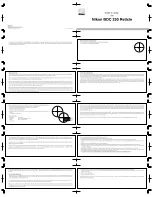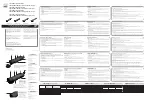
44 • Celestial Photography
C E L E S T I A L P H O T O G R A P H Y
After looking at the night sky for awhile you may want to try photographing it.
Several forms of celestial photography are possible with your Celestron G-8N
telescope. The most common forms of celestial photography, in order of
difficulty are: short exposure prime focus, piggyback, eyepiece projection, and
long exposure deep sky. Each of these is discussed in moderate detail with
enough information to get you started. Topics include the accessories required
and some simple techniques. More information is available in some of the
publications listed at the end of this manual.
In addition to the specific accessories required for each type of celestial
photography, there is the need for a camera — but not just any camera. The
camera does not have to have many of the features offered on today’s state-of-
the-art equipment. For example, you don’t need auto focus capability or mirror
lock up. Here are the mandatory features a camera needs for celestial photog-
raphy. First, a ‘B’ setting which allows for time exposures. This excludes
point and shoot cameras and limits the selection to 35mm SLR cameras.
Second, the ‘B’ or manual setting should not run off the battery. Many new
electronic cameras use the battery to keep the shutter open during time
exposures. Once the batteries are drained, usually after a few minutes, the
shutter closes, whether you have finished with the exposure or not. Look for a
camera that has a manual shutter when operating in the time exposure mode.
Olympus, Nikon, Minolta, Pentax, Canon and others have made such camera
bodies.
The camera should have interchangeable lenses so you can attach it to the
telescope and use a variety of lenses for piggyback photography. If you can’t
find a new camera, you can purchase a used camera body that is not 100-
percent functional. The light meter does not have to be operational since you
will be determining the exposure length manually.
Use a cable release with a locking function to hold the shutter open while you
do other things. Mechanical and air releases are available at most camera
stores.










































